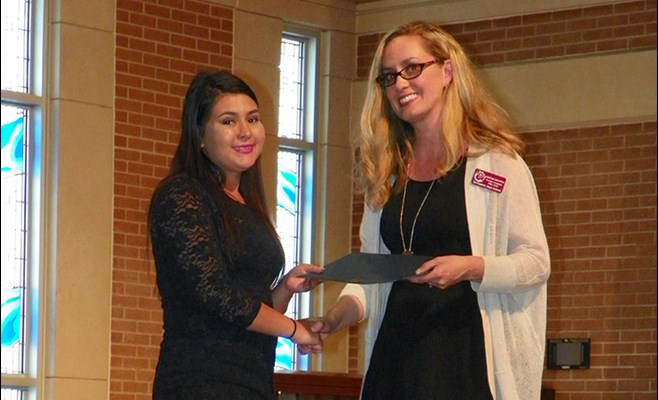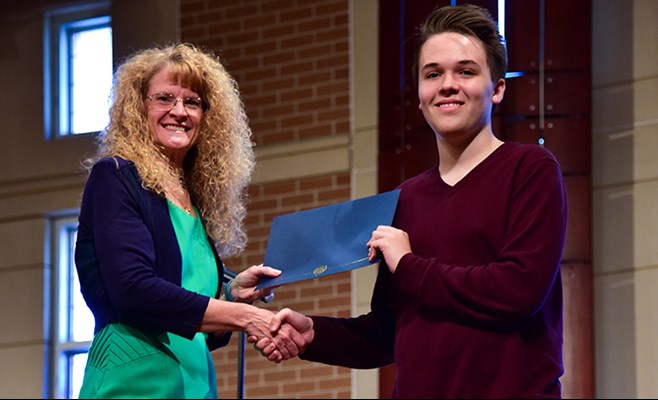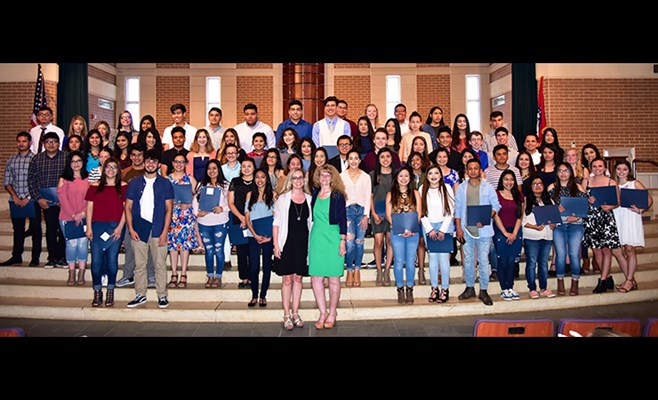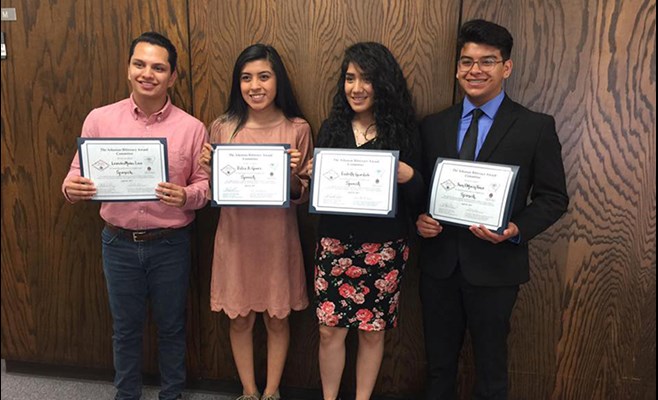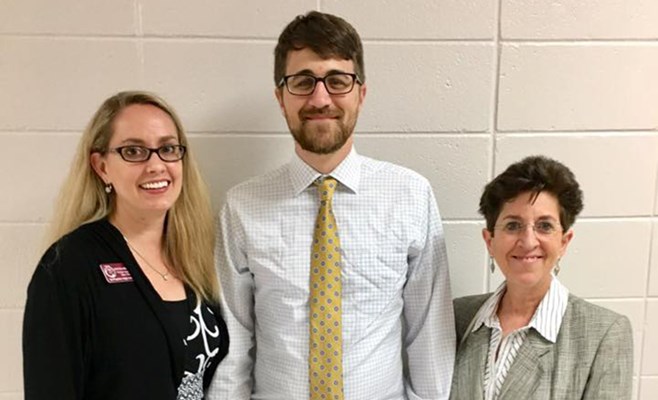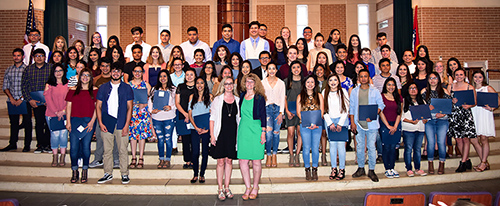
Springdale teens Idalia Siguenza and Ian Gilbert are different in many ways, but both believe a new biliteracy award they earned for proficiency in speaking and writing both English and Spanish will help them in the future.
Siguenza, who graduated May 20 from Springdale High School, came with her family to the United States from El Salvador toward the end of her fifth-grade year. Her mother and other family members continue to speak Spanish while also working to improve their English, and Siguenza believes it’s important to maintain her cultural heritage. She is proud to be in the first group of students to receive the award.
“I’m glad I did it,” Siguenza said about applying for the Arkansas Biliteracy Award. “It’s something that proves I can write and read Spanish well. I get mad when people call themselves Hispanic but they don’t speak Spanish. And, this was something I wanted to do because there is a lot of competition for jobs. It will give me more opportunities.”
Siguenza took her first formal Spanish class in 10th grade. After completing a placement assessment, she was enrolled in Spanish for Heritage and Native Speakers, level 3. Then she completed Advanced Placement Spanish Language and Culture last year, earning the highest score of 5 on the exam, and then completed AP Spanish Literature and Culture this year.
Gilbert just finished his junior year at Har-Ber High School in Springdale. No one in his family speaks Spanish. He was first introduced to the language as an elementary student at a private school in Fayetteville. He wasn’t very interested then but when he entered public school in Springdale as an eighth-grader, he had changed his mind. He has taken Spanish I, II and III and completed Advanced Placement Spanish this spring. He plans to take Spanish literature as a senior next year.
“At first, I mainly was interested in this because I thought I could put it on college applications,” Gilbert said about the biliteracy award. “Also, in college I want to get a minor in Spanish or a double major with Spanish. I think it definitely could help in the future. I don’t think it will be a waste of time. Some people who take a foreign language may not use it, but I think you can use it as much as you want to.”
Gilbert is debating between biology and physics for his other major when he goes to college. He wants to study abroad and feels like Spanish will be the most useful language to know in a number of countries.
In Siguenza’s essay required in the award application, she described the award as beneficial to her community because she is often asked to translate for adults who don’t speak English well. She is interested in a career as a medical assistant, a field where accurate translation could affect quality of life.
Tina Howlett, a University of Arkansas assistant professor of teaching English to speakers of other languages, said research suggests bilingual children have advantages over children who speak only one language in several respects including better working memory, ability to switch between two languages, to develop flexible thinking skills and to solve problems.
“There are cognitive, cultural, academic and economic benefits to being bilingual for both native and non-native English-speaking children,” Howlett said. “The ability to read and think in two or more different languages promotes higher levels of abstract thought, which are important to learning.”
Howlett serves on a committee that began working about a year ago with members of the Arkansas Foreign Language Teachers Association, the Arkansas Teachers of English to Speakers of Other Languages, public school teachers, university faculty and the community to develop the Arkansas Biliteracy Award. The group sent representatives to speak to the Arkansas Board of Education in May about having the Seal of Biliteracy placed on high school diplomas of those students who earn it. The committee will meet later this month to discuss the next steps.
Howlett chairs the ARKTESOL Scholarship and Awards Committee. Three years ago, the Department of World Languages at the U of A brought in a speaker to present information about the biliteracy seal national initiative, inspiring the effort in Arkansas.
In the first year of the program, the group partnered with the Springdale, Fayetteville and Siloam Springs school districts, resulting in 95 students receiving a biliteracy award certificate this spring. Students with a grade-point average of at least 2.0 in English must demonstrate proficiency in English and in one or more languages other than English, write an essay about how biliteracy experiences have prepared them for future goals and career plans, and submit a recommendation letter from a teacher, counselor or school administrator.
Kristen Novotny is Siguenza’s Spanish teacher at Springdale High and also serves on the committee that established the biliteracy award. She is president of the Arkansas Foreign Language Teachers Association. She said the award will help Spanish-speaking students build confidence and pride, be motivated toward academic success, and develop professional skills that will serve the entire community.
“There are still many Spanish-speakers growing up in Arkansas with weak language skills in both Spanish and English,” Novotny said. “Some families are focused on the present need to pay bills and eat and don’t yet have the luxury of planning for academic success. Other families want their children to learn English so badly, or the children want to belong to the American culture so much, that they neglect valuing their cultural heritage and lose their language.”
Siguenza’s role as translator for her family is common for children in immigrant families, Novotny said.
“Emphasizing the power of biliterate skills helps these students see the importance of continuing development of their first language, demonstrating progress in their second, and planning for their futures,” she said. “This is an opportunity for them to be honored for accomplishing what only 15 percent of U.S. citizens have done and what 93 percent of employers want!”
Ellen Rainey, Gilbert’s Spanish teacher at Har-Ber High School, represents the Arkansas Foreign Language Teachers Association on the award committee. She said students who learn a second language and culture are more sensitive to other cultures and people.
“Ian has studied Spanish for four years and has developed a high level of proficiency, but more importantly, he has an additional perspective through which to see the world,” she said. “He has new friends who are native speakers who he can relate to; both cultures can learn from each other.”
Students like Gilbert will have many more opportunities throughout their college careers and lives because of their biliteracy, Rainey said.
“He is an asset to our local community and he will more easily find avenues of opportunity in the international community through language and cultural understanding, regardless of his area of studies for a career,” she said.
Howlett said that, for families who speak English at home, developing a high level of proficiency in another language broadens and enhances an individual’s perspective.
“Learning more than one language is a tremendous asset to an individual, community, and society, and it is a worthwhile investment to develop multilingualism in our nation,” she said. “The home languages of our children need to be valued and supported, and foreign language education should be a requirement of all schools.”
She also explained the distinction between additive bilingualism in which the first language continues to be developed and the first culture to be valued while the second language is added and subtractive bilingualism in which the second language is added at the expense of the first language and culture.
“The research suggests that students who are educated in additive bilingual environments succeed at a greater extent than those whose first languages and cultures are devalued by their schools and by the wider society,” she said. “The Arkansas Biliteracy Award recognizes dual language proficiency as a strength-based approach, not a deficit model, for our nation’s English language learners. For immigrant families, raising bilingual children who can speak the language of their family and friends preserves important relationships and traditions. Strong ties to language, family, culture, and community are all factors that are critical to a child’s identity.”
Howlett is collaborating with William Davis, a U of A doctoral student who chairs the Arkansas Foreign Language Teachers Association advocacy committee, on a research study to investigate how students perceive the relationship between their biliteracy and bilingualism and their reasons for applying for the Arkansas Biliteracy Award.
Topics
Contacts
Heidi Wells, content writer and strategist
Global Campus
479-879-8760,
